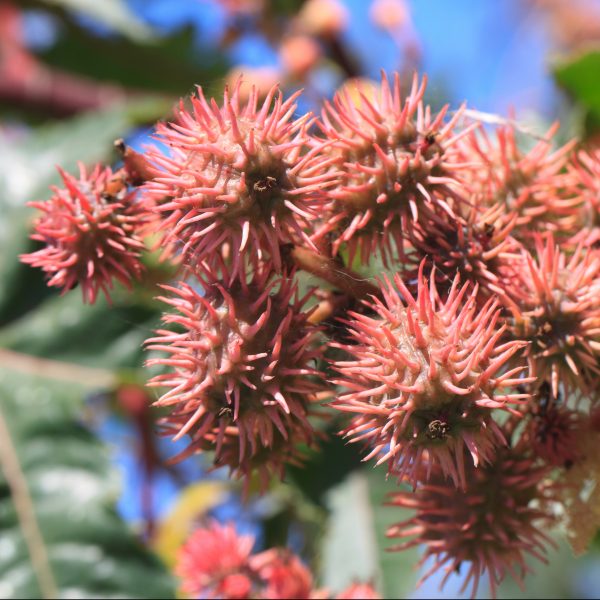Castor Oil (Ricinus communis) also known as Palma Christi (the Palm of Christ) has been used traditionally and in modern day natural medicine to help the body heal itself. Castor oil applied as a “pack” has been used primarily to help improve the health of the organs below where the Castor Oil Pack is placed.
Castor Oil Therapy using a castor oil pack is probably one of the easiest therapies one can use when working to improve the health of the reproductive system. It is a wonderful complement to Self Fertility MassageTM!
5 Ways Castor Oil Packs Improve Reproductive Health
1. Increases Circulation
Castor Oil Therapy stimulates the circulatory system. By increasing circulation, fresh oxygenated blood flows through the abdomen and nourishes the reproductive organs – ovaries, fallopian tubes, and uterus – helping them to properly function. A lack of circulation to these organs prevents them from properly healing if damaged and may promote the formation of excessive scar tissue and adhesions.
In the absence of reproductive health issues, using Castor Oil Therapy to increase circulation is a beneficial way to naturally support egg health and healthy reproductive organ function.
2. Boosts Immune System Function
Lymph nodes surround the reproductive organs and are home to lymphocytes (lymph cells) and lymph (fluid) that make up part of the body’s immune system. The lymphatic system continuously defends the body from disease. Application of a castor oil pack over the lower abdomen stimulates movement of the lymph through the reproductive area. The lymphatic system then goes to work to remove waste (toxins) from the area helping to cleanse the reproductive organs. Cleansing the reproductive organs in turn promotes the healing of any damaged tissues under where the Castor Oil Pack is applied.
3. Promotes Detoxification
The body’s master detoxifier and chemical-processing plant, the liver, is also impacted positively by Castor Oil Therapy. Castor oil therapy increases circulation to the liver which stimulates liver detoxification pathways and improves liver function. NFI.com Senior Herbalist Dalene Barton-Schuster shares that, “The liver removes hormones, drugs, and other biologically active molecules from the blood… The liver also makes 1/3 to 1/2 of all lymph. Liver health is vital to proper function of the lymphatic system. A liver that is overwhelmed due to poor diet, poor lifestyle choices, being sedentary, or exposure to xenohormones, cannot adequately function, or produce lymph as well. This may contribute to hormonal imbalance and disease.” Healthy liver function leads to regular, normal detoxification of the body and hormonal balance.
4. Reduces Inflammation & Pain
Lack of circulation, poor immune system function resulting in sluggish lymph flow or congested lymph glands and an overburdened liver can all contribute to inflammation and pain. There are many fertility health issues where inflammation is present such as ovarian cysts, blocked fallopian tubes, uterine fibroids, PID, Ashermans syndrome and fibrocystic breast disease. Castor Oil Therapy may be one supportive therapy to use as part of a natural fertility program to address any of these issues.
5. Supports Breast Health
Castor Oil Therapy has also been used therapeutically as a part of a natural treatment program for fibrocystic breast lumps. Castor oil packs work to soften the benign lumps that are typically firm, tender and often painful. Herbalist Rosemary Gladstar in her book Herbal Healing For Women: Simple Home Remedies for Women of All Ages shares that she suggests a small Castor Oil Pack be placed over the affected area of the breast, as does Suzanna M. Zick, contributing author to Dr. Aviva Romm’s book Botanical Medicine for Women’s Health. Zick shares that in addition to the Castor Oil, 5-7 drops of Rose Geranium or Sandalwood essential oil could be added for a gentle stimulating action to the circulatory system.
Watch Video: Castor Oil Therapy 101
It is widely believed that many perfectly normal breast changes that happen in women as a result of hormonal fluctuations are causing them to be labeled with Fibrocystic Breast “Disease”. It is also widely believed that having a fibrocystic lump is not at all a disease, rather a condition. If you are living with this condition, continue to educate yourself about What Your Breast Health Says About Your Fertility and talk to your healthcare provider about Castor Oil Therapy.
Castor Oil Therapy has been used for hundreds of years by natural healthcare providers, herbalists and midwives for many reasons and may be a useful natural therapy for you to consider.
Lastly, a #6 if you will. Another important benefit of Castor Oil Therapy is that it may help relieve stress. Stress has a profound impact on those dealing with infertility and reproductive system health concerns. Castor Oil Therapy requires you to temporarily step away from routine, daily demands and forces you to rest. This is the perfect time to focus on positive affirmations, meditating, or even to practice EFT, all of which are a great way to address the emotional component of infertility.
How often should you apply castor oil packs?
Apply a castor oil pack at least 3-4 times a week for 30-45 minutes – not during menstruation or after ovulation when actively trying to conceive. Take advantage of the quiet and restful time Castor Oil Therapy allows you to have. Pssst… it’s really inexpensive too!
Click here to purchase our Castor Oil Kit…
- Barton-Schuster, D. (n.d.). Castor Oil Therapy for Reproductive Health. Retrieved from: http://natural-fertility-info.com/castor-oil-therapy
- Gladstar, R. (1993). Fibrocystic and Related Breast Conditions. In Herbal healing for women: Simple home remedies for women of all ages (pp. 151-157). New York: Simon & Schuster.
- Northrup, C. (2010). The Menstrual Cycle. In Women’s bodies, women’s wisdom: Creating physical and emotional health and healing (Rev. and updated. ed., pp. 131-132). New York: Bantam Books.
- Romm, A. (2010). Fibrocystic Breasts and Breast Pain. In Botanical medicine for women’s health (pp. 219-223). St. Louis, Mo.: Churchill Livingstone/Elsevier.





